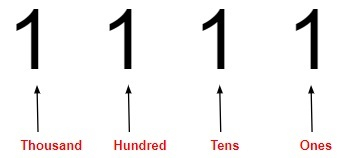
给定一个由数字组成的字符串,任务是将这些给定的数字转换为单词。
比如我们有一个输入“361”;那么输出应该是单词形式,即“三百六十一”。对于解决这个问题,我们需要记住数字和它所在的位置,比如个位、十位、千位等。
代码只支持0到9999的4位数字。所以输入应该在0到9999之间。
让我们考虑1,111,那么位置将会是这样:

Input: “1234” Output: one thousand two hundred thirty four Input: “7777” Output: seven thousand seven hundred seventy seven
我们将使用的方法来解决给定的问题 −
Start
Step 1 → In function convert(char *num)
Declare and initialize int len = strlen(num)
If len == 0 then,
fprintf(stderr, "empty string</p><p>")
Return
End If
If len > 4 then,
fprintf(stderr, "Length more than 4 is not supported</p><p>")
Return
End If
Declare and initialize a char *single_digit[] = { "zero", "one", "two","three", "four","five","six", "seven", "eight", "nine"}
Declare and initialize a char *tens_place[] = {"", "ten", "eleven", "twelve","thirteen", "fourteen","fifteen", "sixteen","seventeen", "eighteen", "nineteen"}
Declare and Initialize a char *tens_multiple[] = {"", "", "twenty", "thirty", "forty", "fifty","sixty", "seventy", "eighty", "ninety"}
Declare and initialize char *tens_power[] = {"hundred", "thousand"}
Print num
If len == 1 then,
Print single_digit[*num - '0']
Return
End If
While *num != '\0
If len >= 3
If *num -'0' != 0
Print single_digit[*num - '0']
Print tens_power[len-3]
End If
Decrement len by 1
End If
Else
If *num == '1' then,
Set sum = *num - '0' + *(num + 1)- '0'
Print tens_place[sum]
Return
End If
Else If *num == '2' && *(num + 1) == '0' then,
Print “twenty”
Return
End else If
Else
Set i = *num - '0'
Print i? tens_multiple[i]: ""
Increment num by 1
If *num != '0' then,
Print single_digit[*num - '0']
End If
End Else
Increment num by 1
End Else
End while
Step 2 → In function main()
Call function convert("9132")
Stop#include <stdio.h>
#include <string.h>
#include <stdlib.h>
//function to print the given number in words
void convert(char *num) {
int len = strlen(num);
// cases
if (len == 0) {
fprintf(stderr, "empty string</p><p>");
return;
}
if (len > 4) {
fprintf(stderr, "Length more than 4 is not supported</p><p>");
return;
}
// the first string wont be used.
char *single_digit[] = { "zero", "one", "two", "three", "four","five", "six", "seven", "eight", "nine"};
// The first string is not used, it is to make
// array indexing simple
char *tens_place[] = {"", "ten", "eleven", "twelve", "thirteen", "fourteen", "fifteen", "sixteen", "seventeen", "eighteen", "nineteen"};
// The first two string are not used, they are to make
// array indexing simple
char *tens_multiple[] = {"", "", "twenty", "thirty", "forty", "fifty","sixty", "seventy", "eighty", "ninety"};
char *tens_power[] = {"hundred", "thousand"};
// Used for debugging purpose only
printf("</p><p>%s: ", num);
// For single digit number
if (len == 1) {
printf("%s</p><p>", single_digit[*num - '0']);
return;
}
// Iterate while num is not '\0'
while (*num != '\0') {
// Code path for first 2 digits
if (len >= 3) {
if (*num -'0' != 0) {
printf("%s ", single_digit[*num - '0']);
printf("%s ", tens_power[len-3]); // here len can be 3 or 4
}
--len;
}
// Code path for last 2 digits
else {
// Need to explicitly handle 10-19. Sum of the two digits is
//used as index of "tens_place" array of strings
if (*num == '1') {
int sum = *num - '0' + *(num + 1)- '0';
printf("%s</p><p>", tens_place[sum]);
return;
}
// Need to explicitely handle 20
else if (*num == '2' && *(num + 1) == '0') {
printf("twenty</p><p>");
return;
}
// Rest of the two digit numbers i.e., 21 to 99
else {
int i = *num - '0';
printf("%s ", i? tens_multiple[i]: "");
++num;
if (*num != '0')
printf("%s ", single_digit[*num - '0']);
}
}
++num;
}
}
int main() {
convert("9132");
return 0;
}nine thousand one hundred thirty two
The above is the detailed content of Translate the following into Chinese: C program to convert a given number into Chinese. For more information, please follow other related articles on the PHP Chinese website!
 The difference between anchoring and aiming
The difference between anchoring and aiming
 Check out the top ten cryptocurrencies worth investing in
Check out the top ten cryptocurrencies worth investing in
 Introduction to parametric modeling software
Introduction to parametric modeling software
 How to solve parsererror error
How to solve parsererror error
 What to do if notepad.exe is not responding
What to do if notepad.exe is not responding
 What does formatting a mobile phone mean?
What does formatting a mobile phone mean?
 How to open dmp file
How to open dmp file
 How to use sort function
How to use sort function




